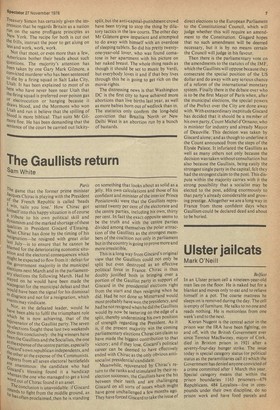The Gaullists return
Sam White
Paris The game that the former prime minister Jacques Chirac is playing with the President of the French Republic is called 'heads I win, tails you lose.' How Chirac got hintself into this happy situation is of course a tribute to his own political skill and clYnamism and the marked shortage of these °alities in President Giscard d'Estaing. "vhat Chirac has done by the timing of his resignation—he resigned with great eclat July----is to ensure that he cannot be artied for the deteriorating economic situation and the electoral consequences which ,111,Ight be expected to flow from it : defeat for "le government majority in the municipal elections next March and in the parliamentarY elections the following March. Had he StaYed on he would have been made the s_eapegoat for the municipal defeat and that 01-11d have been the signal for his dismissal In disgrace and not for a resignation, which events may vindicate. Nor, as the defeated leader, would he nctve been able to fulfil the triumphant role which he is now achieving, that of the r,eiuvenator of the Gaullist party. The seven 1:Y-elections fought these last two weekends ,Ilow this conclusively: the big winners have °een the Gaullists and the Socialists, the one the expense of the centre parties, especially ,`J,Iscard's own republican independents, and 'hue other at the expense of the Communists. ar‘eborts from all seven electoral battlefields (.,re. unanimous: the candidate who had scard's blessing found it a handicap wwhereas the one who managed to get a kind ord out of Chirac found it an asset. in The conclusion is unavoidable: if Giscard 1, tends to fight from the middle ground, as "a has often proclaimed,then he is standing on something that looks about as solid as a jelly. His own calculations and those of his confidant and minister of the inter ior Prince Poniatowski were that the Gaullists represented twenty per cent of the electorate and the centre parties, including his own, thirty per cent. In fact the exact opposite seems to be the truth and with the centre parties divided among themselves the polar attraction of the Gaullists as the strongest members of the coalition not only in parliament but in the country is going to prove more and more irresistible.
This is a long way from Giscard's original view that the Gaullists could not only be split but even destroyed as an effective political force in France. Chirac is thus doubly justified both in bringing over a portion of the Gaullist party in support of Giscard in the presidential elections right from the start and then resigning when he did. Had he not done so Mitterrand would most probably have won the presidency, and had he not resigned when he did the Gaullists would by now be teetering on the edge of a split, thereby undermining his own position of strength regarding the President. As it is, if the present majority win the coming parliamentary elections Chirac can claim to have made the biggest contribution to that victory; and if they lose, Giscard's political career can be deemed to have effectively ended with Chirac as the only obvious antisocialist presidential candidate.
Meanwhile, rejuvenated by Chirac's return to the ranks and stimulated by their reelection successes, the Gaullists have the .bit between their teeth and are challenging Giscard on all sorts of issues which might have gone unchallenged a few months ago. They have forced Giscard to take the issue of direct elections to the European Parliament to the Constitutional Council, which will judge whether this will require an amendment to the Constitution. Gisgard hopes that no such amendment will be deemed necessary, but it is by no means certain the Council will judge in his favour.
Then there is the parliamentary vote on the amendments to the statutes of the IMF, which the Gaullists will oppose because they consecrate the special position of the US dollar and do away with any serious chance of a reform of the international monetary system. Finally there is the debate over who is to be the first Mayor of Paris when, after the municipal elections, the special powers of the Prefect over the City are done away with. With extraordinary ineptitude Giscard has decided that it should be a member of his own party, Count M ichel d'Ornano, who is minister for industry and already Mayor of Deauville. This decision was taken by Giscard alone; and as though to underline it the Count announced from the steps of the Elysee Palace. It infuriated the Gaullists as well as many others not only because the decision was taken without consultation but also because the Gaullists, being easily the strongest single party in the capital, felt they had the strongest claim to the post. This dispute within the majority carries with it the strong possibility that a socialist may be elected to the post, adding enormously to that party's already considerable and growing prestige. Altogether we are a long way in France from those confident days when Gaullism could be declared dead and about to be buried.










































 Previous page
Previous page